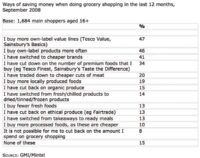 Supermarkets’ own-label offerings have long been a significant part of the UK food sales, holding a share of nearly 29%.
Supermarkets’ own-label offerings have long been a significant part of the UK food sales, holding a share of nearly 29%.
The multiple retailers now manage a sophisticated own-label portfolio with different positionings responding to consumer needs and have been rewarded by continued growth in market share.
During the last 12 months, with the economic downturn accelerating towards the end of 2008, the popularity of own-label has intensified. As consumers have started to feel the pinch, they have switched from branded products to own-label in order to save money.
The purchase of own-label products is seen by consumers as a good way of saving money. Attitudes towards own-label products are improving, causing an erosion of loyalty to manufacturer brands.
Today, more than half of consumers consider own-label to be as good as manufacturer brands. What is more, nearly half of consumers indicate that they are buying own-label products more and own-label value lines more often than they did 12 months ago.
Undoubtedly, the impact of food price inflation on the relationship between retailer and manufacturer brands is complex. However, it is an environment that will tend to favour own-label purchase, especially when the perceived difference between own-label and the comparable branded products is small.
While consumers clearly have brand preferences, the extent of loyalty to specific brands appears to be eroding. Approximately two thirds of consumers tend to stick to a preferred brand. A strong loyalty remains with the ABC1 retired, with almost three quarters of that group being brand-loyal.
For most consumers, there remain risks associated with switching brands, although with the perceived difference between brands, whether from manufacturers or retailers, reducing, the risks are diminishing.
Today, consumers are more willing to switch between own-label and manufacturer brands meaning that brand loyalty is becoming harder to achieve. Despite this, in some categories, such as ice cream and crisps, consumers insist that only manufacturer brands are acceptable.
Increasingly, retailers are behaving like brands. The rate of NPD by retailers is consistent with a strategy of increasing their market share. While retailers’ own-label products traditionally imitated manufacturer brands (me-too strategy), retailers increasingly have the capacity to develop categories with their innovation. Retailers are increasingly spending more on promotions both in absolute terms and as a share of total food advertising spend.
The relationship between brands and own-label is continually changing. Price differentials between brands and own-label have narrowed at the premium end of the market. The success of retailers’ premium own-label (eg Tesco Finest, Sainsbury’s Taste the Difference) has had a positive impact on perceptions of own-label generally.
Looking further a field, retailer brands are well developed in the major European markets, such as Germany. The maturity of the UK market for own-label products also suggests that future growth for own-label will be harder to achieve under ‘normal’ economic conditions.
In the near term, an acceleration of the trend towards own-label purchase appears inevitable. It is by no means certain that this will result in the own-label market increasing in value terms, as consumers switch from both manufacturer brands and retailer premium sub-brands to standard and economy ranges. The other uncertainty is the extent to which consumer behaviour shifts caused by (hopefully) short-term economic conditions last. The mainstream view is that it is likely to cause a step change in behaviour as consumers extend their experience of own-label products.
A return to more favourable economic conditions and a return of consumer confidence are likely to cause a return to the premiumisation trend that was such a feature of the long period prior to the credit crunch-induced economic changes. For the branded manufacturer, a focus on the medium-term outlook is essential to avoid a permanent loss of share to own-label products.




Comments are closed.